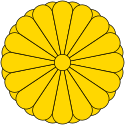1950 Japanese House of Councillors election
Appearance
(Redirected from Japanese House of Councillors election, 1950)
| |||||||||||||||||||||||||||||||||||||||||||||||||||||||||||||
132 of the 250 seats in the House of Councillors 126 seats needed for a majority | |||||||||||||||||||||||||||||||||||||||||||||||||||||||||||||
|---|---|---|---|---|---|---|---|---|---|---|---|---|---|---|---|---|---|---|---|---|---|---|---|---|---|---|---|---|---|---|---|---|---|---|---|---|---|---|---|---|---|---|---|---|---|---|---|---|---|---|---|---|---|---|---|---|---|---|---|---|---|
| |||||||||||||||||||||||||||||||||||||||||||||||||||||||||||||
| |||||||||||||||||||||||||||||||||||||||||||||||||||||||||||||
| This article is part of a series on |
 |
|---|
|
|
House of Councillors elections were held in Japan on 4 June 1950,[1] electing half the seats in the House. The Liberal Party won the most seats.
Results
[edit] | ||||||||||||
|---|---|---|---|---|---|---|---|---|---|---|---|---|
| Party | National | Constituency | Seats | |||||||||
| Votes | % | Seats | Votes | % | Seats | Not up | Won | Total after | +/– | |||
| Liberal Party | 8,313,756 | 29.70 | 18 | 10,414,995 | 35.91 | 34 | 24 | 52 | 76 | New | ||
| Japan Socialist Party | 4,854,629 | 17.34 | 15 | 7,316,808 | 25.23 | 21 | 25 | 36 | 61 | +14 | ||
| National Democratic Party | 1,368,783 | 4.89 | 1 | 2,966,011 | 10.23 | 8 | 20 | 9 | 29 | New | ||
| Ryokufūkai | 3,660,391 | 13.08 | 6 | 1,773,576 | 6.11 | 3 | 41 | 9 | 50 | New | ||
| Japanese Communist Party | 1,333,872 | 4.76 | 2 | 1,637,451 | 5.65 | 0 | 2 | 2 | 4 | 0 | ||
| Labourers and Farmers Party | 200,066 | 0.71 | 1 | 471,649 | 1.63 | 1 | 3 | 2 | 5 | New | ||
| Other parties | 629,370 | 2.25 | 1 | 958,493 | 3.30 | 2 | 0 | 3 | 3 | – | ||
| Independents | 7,632,526 | 27.27 | 12 | 3,465,956 | 11.95 | 7 | 3 | 19 | 22 | –89 | ||
| Total | 27,993,393 | 100.00 | 56 | 29,004,939 | 100.00 | 76 | 118 | 132 | 250 | 0 | ||
| Valid votes | 27,993,393 | 89.22 | 29,004,939 | 92.44 | ||||||||
| Invalid/blank votes | 3,382,542 | 10.78 | 2,371,573 | 7.56 | ||||||||
| Total votes | 31,375,935 | 100.00 | 31,376,512 | 100.00 | ||||||||
| Registered voters/turnout | 43,461,371 | 72.19 | 43,461,371 | 72.19 | ||||||||
| Source: Ministry of Internal Affairs and Communications,[1][2] National Diet | ||||||||||||
By constituency
[edit]| Prefecture | Total seats |
Seats won | |||||||
|---|---|---|---|---|---|---|---|---|---|
| LP | JSP | Ryokufūkai | NDP | LFP | JCP | Others | Ind. | ||
| Aichi | 3 | 2 | 1 | ||||||
| Akita | 1 | 1 | |||||||
| Aomori | 1 | 1 | |||||||
| Chiba | 2 | 2 | |||||||
| Ehime | 1 | 1 | |||||||
| Fukui | 1 | 1 | |||||||
| Fukuoka | 3 | 1 | 1 | 1 | |||||
| Fukushima | 2 | 2 | |||||||
| Gifu | 1 | 1 | |||||||
| Gunma | 2 | 1 | 1 | ||||||
| Hiroshima | 3 | 1 | 1 | 1 | |||||
| Hokkaido | 4 | 2 | 2 | ||||||
| Hyōgo | 3 | 1 | 1 | 1 | |||||
| Ibaraki | 2 | 1 | 1 | ||||||
| Ishikawa | 1 | 1 | |||||||
| Iwate | 1 | 1 | |||||||
| Kagawa | 1 | 1 | |||||||
| Kagoshima | 2 | 1 | 1 | ||||||
| Kanagawa | 2 | 1 | 1 | ||||||
| Kōchi | 1 | 1 | |||||||
| Kumamoto | 2 | 1 | 1 | ||||||
| Kyoto | 2 | 1 | 1 | ||||||
| Mie | 1 | 1 | |||||||
| Miyagi | 1 | 1 | |||||||
| Miyazaki | 1 | 1 | |||||||
| Nagano | 2 | 1 | 1 | ||||||
| Nagasaki | 1 | 1 | |||||||
| Nara | 1 | 1 | |||||||
| Niigata | 2 | 1 | 1 | ||||||
| Ōita | 1 | 1 | |||||||
| Okayama | 2 | 1 | 1 | ||||||
| Osaka | 3 | 2 | 1 | ||||||
| Saga | 1 | 1 | |||||||
| Saitama | 2 | 1 | 1 | ||||||
| Shiga | 1 | 1 | |||||||
| Shimane | 1 | 1 | |||||||
| Shizuoka | 2 | 1 | 1 | ||||||
| Tochigi | 2 | 1 | 1 | ||||||
| Tokushima | 1 | 1 | |||||||
| Tokyo | 4 | 1 | 1 | 1 | 1 | ||||
| Tottori | 1 | 1 | |||||||
| Toyama | 1 | 1 | |||||||
| Wakayama | 1 | 1 | |||||||
| Yamagata | 1 | 1 | |||||||
| Yamaguchi | 1 | 1 | |||||||
| Yamanashi | 1 | 1 | |||||||
| National | 56 | 18 | 15 | 6 | 1 | 1 | 2 | 1 | 12 |
| Total | 132 | 52 | 36 | 9 | 9 | 2 | 2 | 3 | 19 |
References
[edit]- ^ a b Table 13: Persons Elected and Votes Polled by Political Parties - Ordinary Elections for the House of Councillors (1947–2004) Archived 2011-03-23 at the Wayback Machine Ministry of Internal Affairs and Communications
- ^ "27-11 Allotted Number, Candidates, Eligible Voters as of Election Day, Voters and Voting Percentages of Ordinary Elections for the House of Councillors (1947-2004)". Ministry of Internal Affairs and Communications. Archived from the original on 2006-01-04.





